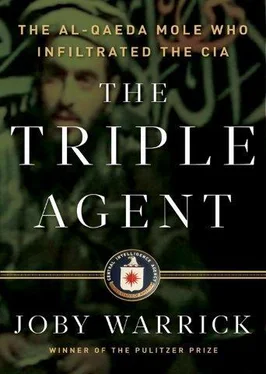In Jordan once again, he had scraped to put his children through college and was looking forward to a quieter time, surrounded by contented, prosperous children and grandkids. Now a half century of upheaval and misfortune could not match the pain he felt deep in his chest.
The car pulled up to the curb on Urwa bin al-Ward Street, and Khalil al-Balawi climbed out quickly and entered the house ahead of his eldest son. There in the living room, on the black sofa framed by the old man’s books, was Humam.
“Salaam alekum, Humam,” the father said. “Peace be with you.”
Humam said nothing. He could not bring himself to look into his father’s eyes.
The two sat in silence. Finally Humam spoke, his head still bowed.
“I have cleared the family’s name, Father,” he said.
“Humam, you did not have to do anything,” the old man said. “Our family name is clean.”
Days passed before Humam uttered another word to his family. His father believed his son would eventually open up about what had happened, so he did not pry. Five days went by, then a week. Finally, on a day when the two were again alone in the living room, Khalil al-Balawi could no longer contain himself.
“Did they beat you?” he asked softly.
Humam lifted his head, finally, to meet his father’s gaze. His cheeks were flushed, and when he finally spoke, his words, in Arabic, were a barely audible hiss.
“No,” he said. “They humiliated me.”
Amman, Jordan—February 8, 2009
Ali bin Zeid squeezed his big frame into his office chair and scowled at the computer screen. The half-written file, already coded “secret” but awaiting a conclusion that he would provide, if only he could decide what it should be, was still there. The report bore an Arabic caption that read “Assessment” and “Humam Khalil al-Balawi,” and it was entirely routine. Except for this last part, the ending.
What potential is seen for this subject? That was the stumper.
Bin Zeid was tired, feeling the strain of the Mukhabarat’s peculiarly erratic hours and the stress of so many difficult cases, including this one. It annoyed him that he rarely had time for a decent meal with his wife, let alone the honeymoon that he had been promising her for more than a year. The late-winter sun was just low enough in the sky to bathe his fourth-floor office in a golden glare that washed out electronic type and made the room stuffy. Bin Zeid turned away from the screen and again picked up Balawi’s paper file. He began to read.
Humam al-Balawi had talked, eventually.
On his third day in the Mukhabarat’s vise, and in a handful of secret meetings afterward, the physician gave up names of figures inside al-Hesbah and other jihadist Web sites. He told what he knew about networks of jihadist bloggers and their funding. He spoke so openly that the chains and cuffs came off, and the sessions became freewheeling conversations. Afterward he would sit quietly, face flushed, head cradled in his hands, awash in unspoken emotion.
Balawi swore to his interrogators that in his heart of hearts, he opposed terrorism in all its forms. It was a claim that seemed wildly at odds with his posts lauding such notorious butchers as Abu Musab al-Zarqawi.
“It is true that I like to express my feelings in my writing,” he said at one point. “But I’m against violence, including military action. Our religion forbids terrorism.” Balawi surveyed the skeptical faces around him. It’s not who I am , he protested. The blogs, the fake persona, the cries for blood—none of it was real.
It’s just a hobby , he said.
After his release the Mukhabarat’s men fanned out to try to corroborate his information. They also deepened their scrutiny of Balawi himself, tapping his phones, trailing his movements, and reaching outside Jordan for evidence of ties to terrorist groups. The agency placed Captain Ali bin Zeid in charge of Balawi’s file and passed the essentials to the CIA, which shared space with the Jordanians in a joint counterterrorism center in a building on the outskirts of Amman. The American intelligence agency would want to check the names Balawi provided against its own database.
The more they probed, the murkier and more dangerous Balawi’s secret life appeared. Despite his claims about opposing violence, he had sought at least twice to join the Zarqawi-led Sunni insurgency in Iraq, the officers discovered. Why he had ultimately failed to do so was unclear. Perhaps his courage had flagged, or he had felt guilty about orphaning his children; possibly he had been forced to admit to himself that he was a poor candidate for guerrilla warfare, lacking in both physical strength and military training. As a backup plan, he canvassed friends and relatives to collect money for the insurgency and raised just over fourteen hundred dollars before abandoning the effort. After Israel’s invasion of Gaza in 2008, he had tried to volunteer as a Hamas medic to treat Palestinian wounded.
Balawi had also had a flirtation, and possibly more, with a known terrorist organization in Turkey, it was learned. While living in Istanbul as a student, he had attended meetings of the Islami Büyükdoğu Akincilar-Cephesi, or Great Eastern Islamic Raiders’ Front, a group that claims kinship with al-Qaeda and advocates the overthrow of secular governments in the Middle East, from Ankara to Amman to Cairo. Turkish police have credited the IBDA-C with several spectacular terrorist attacks, including bombings of two synagogues in Istanbul in 2003 that killed twenty-four people.
Balawi’s interest in the group was something he apparently shared with the woman he eventually married, Turkish sources revealed. Humam and Defne Bayrak were first introduced in 2001 in an Internet chat room for young Muslims. After the two began dating, they connected with other couples at social events that were essentially recruitment sessions for the Raiders’ Front: small-group lectures, fund-raisers to support Palestinian militants.
Defne, tall and lithe with a doll’s porcelain complexion, had admired Humam’s intelligence but really fell for his conservative politics, according to her own account. She had been living at her parents’ house in Istanbul, working as a journalist and brushing up on her Arabic-language studies, when the Jordanian medical student burst into her life. Three months later, they were making wedding plans.
“I liked his personality, his piousness, his strict following of the religion,” she said.
During their courtship the couple began to change. Neither had ever been considered devout in a traditional sense. Defne wore a head scarf in public, but so do a majority of Turkey’s adult women. Humam had memorized large portions of the Koran as a child but regularly skipped Friday prayers at the mosque and referred derisively to his native Jordan as “that Islamic country.” But as a couple he and Defne embraced a creed that was gaining popularity among Turkey’s college-educated elite and whose chief tenet was rage against the non-Muslim West. Rooted in the same decades-old resentments expressed by millions of other Muslims, but peculiar to privileged young adults who came into maturity in the age of al-Qaeda, this brand of faith perceived CIA and Israeli intelligence plots behind the terrorist attacks of September 11, 2001. Its adherents saw the invasions and occupations of Iraq, Gaza, and Afghanistan as part of a Western crusade to destroy and corrupt Islam, loot natural resources, and slaughter thousands of innocents.
Humam and Defne’s new passion was partly driven by personal and family history: Humam was a son of Palestinian refugees and treated refugee children; Defne had worked for conservative Turkish newspapers, translating Arabic news accounts about fighting in Iraq and Afghanistan. Defne, who friends say was the more strident of the two, had also translated laudatory books about al-Qaeda leader Osama bin Laden and former Iraqi leader Saddam Hussein. The former had been titled Osama bin Laden, the Che Guevara of the East .
Читать дальше












